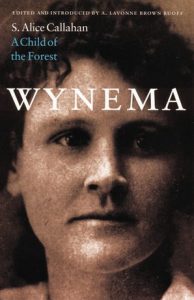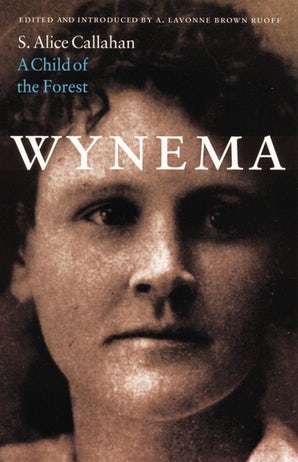Public domain image.
Sophia Alice Callahan
Born: 1868 in Sulphur Springs, TX
Died: 1894 in Muskogee, Oklahoma
Noted For: Sophia Callahan is noted as the author of “Wynema, A Child of the Forest” (1891), thought to be the first novel written by a Native American woman. The book includes content related to women’s rights and suffrage.
When the 19th Amendment became law in 1920, Native American women still did not have the right to vote—they weren’t considered citizens until the passage of the Indian Citizenship Act (also known as the Snyder Act) four years later. Even then, states still found ways to deny Native Americans access to the ballot for decades to come, employing many of the same suppressive policies used to deny voting rights to other minorities.
Because of these conditions, there is little to no historical documentation of Native American involvement in the Texas suffrage era, with one interesting exception: Sophia Callahan, a Sulphur Springs native and suffrage supporter who is believed to be the first Native American woman to publish a novel.
Teacher and writer….
Sophia was the daughter of a white mother and Native American father, a rancher and politician who also edited the Indian Journal, a regional periodical for Native Americans.
While teaching school in Muskogee, Oklahoma (known at the time as “Indian territory”), Sophia became a member of the Women’s Christian Temperance Union, which may have influenced her interest in suffrage. (Many suffragists were also supporters of the turn-of-the-century movement against alcohol use.)
In 1891, Sophia wrote “Wynema, A Child of the Forest”, the fictional story of a young Native American woman who enters into a mixed-race marriage and becomes a teacher.

From the University of Nebraska Press.
While the book was constructed in the romantic novel form popular at the time, Sophia used the story to explore important themes of social justice and reform, such as voting rights, temperance, and the conditions faced by Native Americans during Sophia’s era, including massacres, loss of land, and forced assimilation.
In one scene, a primary character named Genevieve, is troubled—and offended— by a male acquaintance’s “indifferent and slighting manner” of referring to the social issues that Genevieve supported, including suffrage.
When he describes the cause of suffrage as “unwomanly”, and “out of a woman’s sphere”, she points out that his way of thinking is “absurd” and going out of style, and that “sensible men are beginning to open their eyes and see things in a different light from what their ancestors saw them.”
Sadly, Sophia fell ill and died at the age of 26, just three years after the book’s publication. However, her novel was re-discovered and reprinted in the late 20th century, and continues to be the subject of scholarly study today.
Additional Learning:
“Native Americans Weren’t Guaranteed the Right to Vote in Every State Until 1962”: from the History Channel

